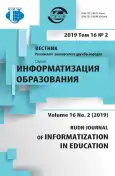The formation of course content of computer science in the context of ensuring personal information security
- Authors: Beshenkov S.A.1, Shutikova M.I.2, Ryzhova N.I.1
-
Affiliations:
- Institute of Education Management of the Russian Academy of Education
- Academy of Social Management
- Issue: Vol 16, No 2 (2019)
- Pages: 128-137
- Section: COMPUTER SCIENCE TEACHING
- URL: https://journal-vniispk.ru/2312-8631/article/view/333495
- DOI: https://doi.org/10.22363/2312-8631-2019-16-2-128-137
- ID: 333495
Cite item
Full Text
Abstract
Problem and goal. The article considers the possible ways of development of the general course of informatics: with technological or socio-cultural dominant. The aim of the study is to identify the main factors (significant circumstances) that make it possible to develop the content of the training of this course in a socio-cultural way. This, in turn, allows us to adequately formulate information threats to the human person, characteristic of the digital society and develop a strategy to protect against these threats. Methodology. The study is based on the analysis of the main challenges of the digital society and the internal logic of the development of general education course of informatics: from computer literacy to the subject of the general education cycle, and from it - to metasubject. Results. The study highlights the main factors that allow to develop the content of the general education course of informatics in the socio-cultural key, which allows to formulate the main strategic directions of protection of the human person from the information threats of the digital society. These factors can be described as consistency, socialization, technologization. These factors will lead to the actual development of the general course of informatics, if within the informatics will be prerequisites for their implementation. The development of the subject area of informatics creates such prerequisites, since the most important concept of the modern course of informatics is the concept of information, symbolic model with a significant social context. At the same time, symbolic modeling is one of the main types of universal educational activities. Conclusion. It is shown that in order to ensure the information security of the individual, it is necessary, first of all, to develop a system of representations and information-cognitive tools that allow the student to adequately interact with the surrounding world. The development of this tool can take over computer science.
About the authors
Sergey A. Beshenkov
Institute of Education Management of the Russian Academy of Education
Author for correspondence.
Email: srg57@mail.ru
doctor of pedagogical sciences, head of the laboratory of informatization of the Institute of Education Management of Russian Academy of Education
5/16s1B Makarenko St., Moscow, 119121, Russian FederationMargarita I. Shutikova
Academy of Social Management
Email: raisins_7@mail.ru
doctor of pedagogical sciences, professor of the department of methods of teaching technology, informatics and information and communication technologies of the Academy of Social Management
3 Еnisejskaya St., bldg. 3, Moscow, 129344, Russian FederationNatalia I. Ryzhova
Institute of Education Management of the Russian Academy of Education
Email: nata-rizhova@mail.ru
doctor of pedagogical sciences, leading researcher of the Institute of Education Management of Russian Academy of Education
5/16s1B Makarenko St., Moscow, 119121, Russian FederationReferences
- Beshenkov S.A., Rakitina Е.A. Modelirovanie i formalizaciya: metodicheskoe posobie [Modeling and formalization: methodical manual]. Moscow: Lab. baz. znanij Publ., 2002. 333 p.
- Beshenkov S.A., Shutikova M.I., Labutin V.B., Filippov V.I., Mindzaeva E.V. Konvergenciya informatiki i tekhnologii kak platforma sovremennoj intellektual’noj tekhnosfery [Convergence of information science and technology as a platform of modern smart technosphere]. Informatika i obrazovanie [Informatics and education]. 2018. No. 5(294). Pp. 3—6.
- Beshenkov S.A., Mindzaeva E.V., Shutikova M.I. Informacionnaya bezopasnost’ v kontekste vyzovov cifrovogo sociuma [Information security in the context of the challenges of the digital society]. Chelovek i obrazovanie [Man and education]. 2018. No. 2(55). Pp. 55—61.
- Gendina N.I. Formirovanie informacionnoj kul’tury lichnosti: ot teorii — k modeli informacionnogo obrazovaniya [Formation of information culture of personality: from theory to model of information education]. Otkrytoe obrazovanie [Open education]. 2007. No. 1(60). Pp. 4—10.
- Kara-Murza S.G. Manipulyaciya soznaniem [Manipulation of consciousness]. Moscow: Algoritm Publ., 2000. 688 p.
- Kinelev V.G. Obrazovanie dlya informacionnogo obshchestva [Education for the Information Society]. Otkrytoe obrazovanie [Open education]. 2007. No. 5(64). Pp. 46—57.
- Kolin K.K. Budushchee informatiki v 21 veke: rossijskij otvet na amerikanskij vyzov [The future of informatics in the 21st century: the Russian response to the American challenge]. Otkrytoe obrazovanie [Open education]. 2006. No. 2(55). Pp. 73—77.
- Kutyr’ev V.A. Kul’tura i tekhnologiya. Bor’ba mirov [Culture and technology. The struggle of the worlds]. Moscow: Progress-tradiciya Publ., 2001. 240 p.
- Rastorguev S.P. Informacionnaya vojna. Problemy i modeli. Ekzistencional’naya matematika: uchebnoe posobie dlya studentov vuzov [Information war. Problems and models. Existential mathematics: textbook for university students]. Moscow: Gelios ARV Publ., 2006. 240 p.
- Semakin I.G. i dr. Informatika. 7—9 klassy. Bazovyj kurs [Computer science. Grades 7—9. Basic course]. Moscow: BINOM. Laboratoriya znanij Publ., 2018. 145 p.
- Ugrinovich N.D. Informatika. 8—9 klassy. Bazovyj kurs [Computer science. 8—9 classes. Basic course]. Moscow: BINOM. Laboratoriya znanij Publ., 2018. 168 p.
- Fuko M. Slova i veshchi. Arheologiya gumanitarnyh nauk [Words and things. The archeology of the humanities]. Saint Petersburg: A-cad Publ., 1994. 408 p.
- Fukuyama F. Konec istorii i poslednij chelovek [The end of history and the last man]. Moscow: Еrmak Publ., 2004. 588 p.
- Shutikova M.I. Postroenie soderzhaniya obshcheobrazovatel’nogo kursa informatiki na osnove razvitiya koncepcii kommunikativnoj deyatel’nosti [Construction of the content of the general course of informatics on the basis of the development of the concept of communicative activity]: avtoref. dis. … d-ra ped. nauk. Moscow, 2009. 44 p.
Supplementary files









